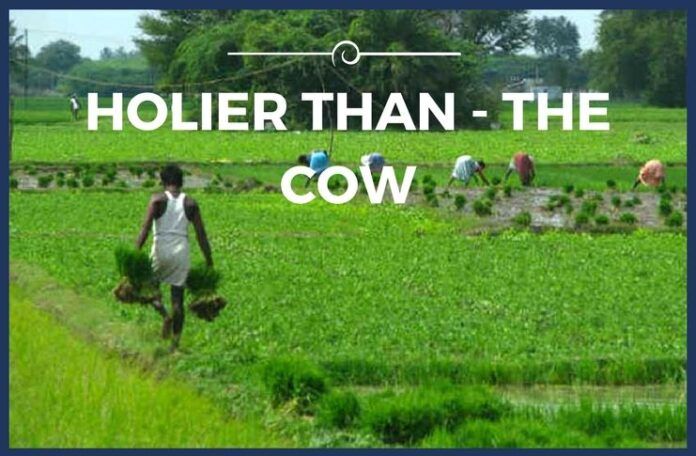
All political parties united against taxing agricultural income
[dropcap color=”#008040″ boxed=”yes” boxed_radius=”8px” class=”” id=””]T[/dropcap]he Cow has been an issue of intense debates since BJP came to power. Arun Shourie sarcastically says NDA = UPA + Cow. There are two very opposing camps arguing on matters relating to the cow: whether cow slaughter should be permitted, whether buffalo meat is also beef, whether beef eating should be permitted, who will fund it if a cow is protected after its milching lifespan, whether gau-rakshaks are social workers or criminals, etc.
The Constitution doesn’t permit the Central Government to tax agricultural income
But there is another issue which is holier than the Cow, holier because (unlike the cow issue), almost all the political parties, including the BJP, Congress and Communists are united on this. And that is their opposition to taxing agricultural income. When NITI Aayog member Bibek Debroy said, the government needs to tax agricultural income beyond a certain level, the Finance Minister clarified that the Government has no such proposal.
Even Dr M.S. Swaminathan has opposed the tax on agricultural income, saying, “I do not agree with the tax on agriculture income since agriculture is the major source of livelihood for over 50% of our population. It is a livelihood industry with multiple impacts on human life. There could be other methods of taxing rich farmers with multiple sources of income”.
Let us try to understand both the two sides to judge the issue objectively.
The Constitution doesn’t permit the Central Government to tax agricultural income; so it can do so only after amending the Constitution, and after facing the wrath of the entire political class (apart from the other rich and powerful). States can tax it, but they generally choose not to.
Indirect taxes (like Sales and Service Tax, shortly GST payable by everyone) are payable by farmers also. Of course, Governments exempt or moderate these taxes on items bought mainly by farmers.
[dropcap color=”#008040″ boxed=”yes” boxed_radius=”8px” class=”” id=””]T[/dropcap]he rationale for not imposing the income tax on agricultural income is that farming is already not remunerative, farmers are mostly poor & we’re talking about doubling their income, and finally that it impacts the lives of about half our population. Some also argue that taxing agricultural income will increase the prices of food items.
The efforts of the Government to convert the national economy from cash to digital form will be bolstered by taxing agricultural income because tax-evaders who show agricultural income to evade income tax will be forced to pay taxes.
But all these don’t justify not taxing agricultural income. In the coming years, when the Government helps increase the income of farmers with many measures (including fixing the MSP higher), the prices of food items will go up anyway. The more we distort market forces by making exemptions, the more we are distorting the entire economy, and the price we pay is far higher.
Since agriculture is not comparable to conventional business, personal income tax rules can be made applicable to agricultural income, apart from reckoning their income after allowing for expenses. Then income up to about Rs 3 lakhs a year will be tax-exempt, and with adequate savings, it is possible to avoid Income Tax up to Rs 4-5 lakhs a year.
If there are multiple members in a family, and the income is distributed across them (which is not possible for salaried employees), it is possible to avoid income tax on even 2, 3,… N times every individual’s income. So, we’ll be more than fair in taxing agricultural income.
Also, why should those who earn in crores every year from agriculture be exempt from income tax?
And the most important reason for taxing agricultural income is to plug this stealthy way by which politicians and other rich and famous people (including many industrialists, professionals, and film personalities) avoid taxes amounting to crores by showing their non-agricultural income as agricultural income. This also involves creating black money and money laundering.
[dropcap color=”#008040″ boxed=”yes” boxed_radius=”8px” class=”” id=””]I[/dropcap]t is argued that Income from agriculture is not fixed, and so agricultural income should not be compared to salary income. Fair enough! The Government can permit income to be averaged over 3 years, or refund from taxes paid in up to the past 3 years due to loss from agricultural income, to the extent the income is below the taxable threshold.
Even companies investing in the agricultural sector are exempt from income tax, and the loss of revenue to the Government due to an exemption of these companies is very high too.
The efforts of the Government to convert the national economy from cash to digital form will be bolstered by taxing agricultural income because tax-evaders who show agricultural income to evade income tax will be forced to pay taxes. Otherwise, agriculture will continue to keep our economy cash-centric.
The argument that farmers are a huge vote bank and so this is risky is not true, because most of the vote-bank farmers won’t be taxable anyway.
So, if the Government is serious about widening the tax base by fair means, increasing revenues for development, and containing black money, it should make bold moves, amend the constitution and start taxing agricultural income, along lines similar to tax laws for the salaried, but reckoning income after deducting the expenses, ensuring only the middle class and rich farmers are taxed and are given fair relief in their years of loss from agriculture.
Only politicians have powers to make or amend the Income Tax laws, but they have a conflict of interest; it is in their self-interest to preserve the laws as they exist, even to the detriment of the nation.
So, if the Government doesn’t amend the income tax laws, we, the people, should mobilize public opinion through social media and ensure that this is done without delay.
[dropcap color=”#008040″ boxed=”yes” boxed_radius=”8px” class=”” id=””]L[/dropcap]et me clarify that I’m strongly pro-farmers, and please read my article on ‘Farm-Loan-Waivers’ that argues why the Central Government should take several steps to make agriculture attractive, especially for the poor and middle-class farmer.
In fact, the additional income earned by taxing agricultural income can even be ploughed back to agriculture sector itself, as it needs a huge helping hand.
It’s time we made the ‘Holier than the Cow’, less holy!
Note:
1. Text in Blue points to additional data on the topic.
2. The views expressed here are those of the author and do not necessarily represent or reflect the views of PGurus.
- How BJP can get 33%+ vote share in TN - April 1, 2024
- A transparent, equitable electoral funding alternative - March 19, 2024
- How TN BJP can come to No. 1 or No. 2 in 2024 LS polls - January 11, 2024











All those who earn a TAXABLE annual income must pay the required Income Tax. It’s wrong to allow blanket exemption to money spinners for being Agricultural.
Examples galore of large scale farms enjoying subsidized land, fertilizers, water, power etc misusing provisions, making commercial entities, earning huge profits.Why should they and such others be exempt?
Income tax must be based on one year’s income and tax will vary if income varies as in case of the salaried class.